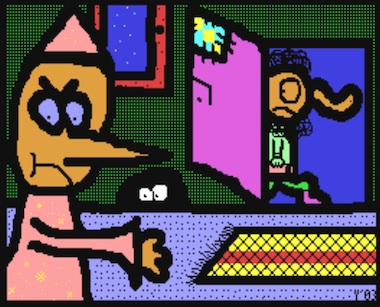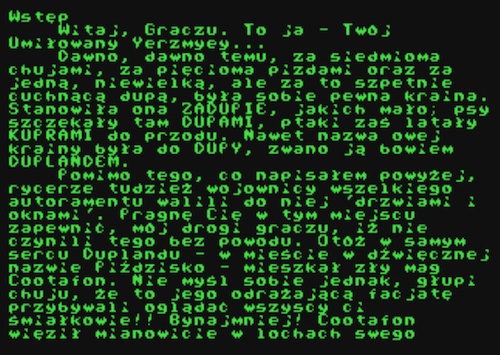Independent Text Adventures in Polish
 An overview of the first wave of Polish text-based games would be incomplete without mentioning independent developers distributing their games among first online communities of Atari, ZX Spectrum and early PC users. Unsupported by offcial computer magazines, like “Bajtek” or “CD Action”, these games could fall into oblivion, if not for the effort of dispersed communities formed by early games enthusiasts.
An overview of the first wave of Polish text-based games would be incomplete without mentioning independent developers distributing their games among first online communities of Atari, ZX Spectrum and early PC users. Unsupported by offcial computer magazines, like “Bajtek” or “CD Action”, these games could fall into oblivion, if not for the effort of dispersed communities formed by early games enthusiasts.
First on the list are three tittles: Droga do Duplandu (first edition 1993, Atari XL ?) Ucieczka ze spejs-szipu and Smok [1] by Yerzmyey (Michał Bukowski) from Hooy Program group in the middle of 90. Without a parser and a command line these games were not IF, but branching narratives: by the end of most textual segments users were given alternatives in form of direct questions or highlighted words and phrases.
All three games are a strong, reblaisian parody of both literary works and IF games, full of indecent vocabulary and depictions of erotic, grotesque, absurd events. The lightest of them, Smok starts like this:
Quite a strange sight outstretches before you: all town dwellers are walking naked on the streets, exactly how God have created them. It is an interesting phenomena, as long as naked are (only) lovely ladies who are not accompanied by ugly gentlemen (not to mention old farts). You decide to ask one of the nudists what is the reason behind this total dishabille. Here is what he replies: my dear fellow, better get undressed, because if you don’t a curse of erotomaniac dragon will fall upon our town.By professional gamers and game reviewers seen as pranks, not "serious" games, HOOY PROGRAM's productions were pushed out of the official computer game history in Poland. At the same time they managed to gain a cult status among online communities, proven by 2003 re-edition of Droga do Duplandu with updated graphics and sound. No wonder. With their literary inventiveness, humor and impressive range of cultural allusions, Droga do Duplandu or Smok, are simply more engaging and fun than the acclaimed productions from the eighties and early nineties. The latter one most often than not were made to look and feel like games from the West, which makes them today as much outdated and unispiring as their American on British counterparts. In other words, perhaps our true 8 bit Homer is Yerzmyey, not Marcin Borek Borkowski (author of Puszka Pandory) or Wiesław Florek and Pior Kucharski (creators of Mózgprocesor)....

Droga do Duplandu - introductory text.
An interesting mix cross-medial influences, quite symptomatic for the early stage of remediation (from print to press) can be found in Księżyc 2097 (eng. Moon 2097) – paragraph game for Commodore 64 form 1997: a space Oddysey about crash landing on the moon. Player’s goal is to find theier mothership and save some secret files that were left onboard. The game was using questions and answers rather than parser, commands or links.
Another game worth mentioning, though not quite independent, developed on the early stages of an acclaimed studio, is Barahir by LK Avalon for Atari XL/XE in 1993 for Atari XL, written by Daniel Szymczuk and regarded as the first computer RPG in Poland. Set in a fantasy world, the game was rich with graphical elements and sound, but text was still dominant.
1 Unknown date, not to confuse with another Smok from 1989, by Arkadiusz Lubaszek and Art Soft, which was purely graphical. See also atarionline article)
Mariusz Pisarski
- Techsty- archiwum
- Techsty issue 1
- Techsty issue 2
- Techsty issue 3
- Techsty issue 4
- Techsty issue 5
- o Techstach
- wizytówka
- about Techsty
- in English